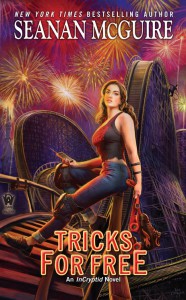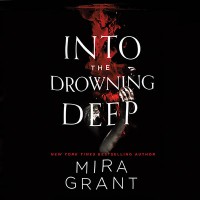
Libromancer's Apprentice
The reading habits of a bibliovore & Technology Services Librarian
More at libromancersapprentice.blogspot.com

I spent the other weekend playing a character that was a monster. It was utterly amazing.
I finally transcribed my narrative/epilogue and posted it on the interwebs if anyone wants to literally read 6 pages of me talking about my character. :)
https://libromancersapprentice.blogspot.com/2018/10/fiction-magic-shadows.html


Night and Silence (October Day #12) / Seanan McGuire
Previously reviewed:
Oh Toby.
When I began my review for The Brightest Fell, I remarked from the start that it felt like the book marked a turning point, that we had hit a new stage, that debts were starting to come due. That isn't to say that she never pays a price, but the prices are becoming more dear. What she stands to lose more precious, and what she retrieves is not quite whole.
Toby starts this story vulnerable. There's the humor we all love and expect, but she is raw and exposed, her network weakened. Tybalt is keeping distant and Gilly has been taken. Threads of Toby's family history are starting to show, and at it's heart, Night and Silence is a book about family.
The ending is uneasy, uncomfortable, and it should be. This isn't a happy ending. Things are too raw, too forced by necessity. There is hope, but there is also grief from change and the loss that comes from change.
An enjoyable continuation, paired with an excellent novella centered on Gilly and where she is now.
Advance Reader Copy courtesy of Daw (Penguin RandomHouse) in exchange for an honest review; changes may exist between galley and the final edition


Previously Reviewed
Rose also has growing pains, at the end of the last novel she was reunited with her teenage love, and they are both learning about each other and what being together as ghosts means... and what their type of existence requires. Her other relationships grow, change, and develop too, adding depth and filled with twists both expected and surprising.
I'm seeing this book listed in places as 2 of 2 in its series, and I'm hoping that's an error. There is a lot unanswered, unfinished, in this story, and I want to see where this road takes us.
Advance Reader Copy courtesy of DAW (Penguin RandomHouse) in exchange for an honest review; changes may exist between galley and the final edition
Well, space witches in general, but bonus points if they're queer AF.
This was inspired by coming across the author review blurbs for Gideon the Ninth by Tamsyn Muir.
"Lesbian necormancers explore a haunted gothic palace in space! Decadent nobles vie to serve the deathless emperor! Skeletons!" - Charles Stross
"This crackling, inventive and riotous book from an original voice is a genuine pleasure. Also the author is clearly insane." - Warren Ellis
<3
To my new Space Witch reading list I add:
The Stars are Legion / Kameron Hurley - lesbian space witches, lesbian space warriors, weird creepy shit. you know, the good stuff.
Voidwitch Saga by Corey J White (Killing Gravity, Void Black Shadow, Static Ruin)
- can't remember if she's queer or not, but she's definitely a space witch
"Faith in not rational. Do you know what a cathedral is, Chief Engineer?"
"A kind of church," she said. "A big church."
"A church that took centuries to build," he clarified. "And could cost hundreds of lives in the building. A church that represented an absolutely absurd investment for a medieval lord. And yet they got built anyway. For the glory of God."

Grail, p. 292, by Elizabeth Bear


There are no Aeslin mice in it.
But they have their own novella at the end (and it's kind of adorable).
In Magic for Nothing I was a little harsh on Antimony... and what I said still holds true, she needed to grow up and she did. So now we get an Annie who has learned in a way she never knew before what exactly it means to be a Price, perhaps still with resentment and issues with Verity, but that is tempered with understanding as well. I like this Annie.
Hiding out from the Covenant (and her family), Antimony has donned an old identity and getting by as an employee at the Lowryland amusement park while she attempts to get her life back together. Life, on the other hand, has its own plans for her. Lowryland turns out to be run by a cabal of magic users who offer to teach her to control the fire insider her, friends from her past are around, and deadly accidents start occurring.
So it's up to one stranded Price, her friends, her boyfriend, and a crossroads ghost to handle a particularly unexpected threat.
Advance Reader Copy courtesy of DAW (Penguin RandomHouse) in exchange for an honest review; changes may exist between galley and the final edition.

 I... don't even know where to start summarizing this story or reviewing beyond this: you will cry. This story brings all of the Feels and will rip out your heart. And you will love it all the more for it.
I... don't even know where to start summarizing this story or reviewing beyond this: you will cry. This story brings all of the Feels and will rip out your heart. And you will love it all the more for it.Buy, read it, add it to your library, it's worth it.
From the publisher:
When Hazel Johnson and Mari McCray met at church bingo in 1963, it was love at first sight. Forced apart by their families and society, Hazel and Mari both married young men and had families. Decades later, now in their mid-’60s, Hazel and Mari reunite again at a church bingo hall. Realizing their love for each other is still alive, what these grandmothers do next takes absolute strength and courage. From TEE FRANKLIN (NAILBITER’s “THE OUTFIT,” Love is Love) and JENN ST-ONGE (Jem & The Misfits), BINGO LOVE is a touching story of love, family, and resiliency that spans over 60 years.
Advance Reader Copy courtesy of Image Comics in exchange for an honest review; changes may exist between galley and the final edition.

Dust by Elizabeth Bear is one of my favorite novels, and was one of the easy selections for when I started doing this book club thing. But while I reread Dust with some frequency, I think I only read Chill (Jacob's Ladder #2) once, immediately after purchasing it. There's a good chance that my reading of it was too colored by my expectations and memories of Dust, a younger me wanting the exact same thing as before, only new and different. Similar to my experiences with American Gods and Anasazi Boys, except Chill is a true sequel.
What I remember is that this is a story of after and of pushing through. The Jacob's Ladder is again in motion, reduced through deliberate effort and through the abuse of its rough relaunch. Similarly, the characters are in a state of flux, challenge, and recovery. Perceval struggles with the unwanted mantle of Captain, the cost of power and conflict, and the ghost of Rein that now lives in the AI of the ship. Tristen and Benedick go from support characters in Perceval and Rein's quest, to a quest of their own as they deal with their own ghosts of a sort.
So, we'll see how this read goes, and I'll attempt to have my review of it up within February!

Wherein Morgoth spreads the misery though puppetry. Releasing Húrin to the world after years of captivity, he aims to increase strife among Men and Elves. His reception is varied, with his own people shunning him as in league with Morgoth. Even the Eagles state that "Húrin Thalion has surrendered to the will of Morgoth." This reception makes me think of Gandalf speaking of how to treat Gollum, and the importance of mercy. I wonder how this story would have changed if people had shown him kindness and acceptance, while acknowledging that Morgoth had his plans for Húrin still. But again, that is often the beauty of the "curses" Tolkien lays against his characters, their fated doom often not of divine or infernal end, but the result of deliberate action and self-fulfilling prophesy.
We some of what could have been, when Melian speaks kindness in face of his twisted perceptions and grief, but it leaves Húrin bereft of purpose and so he passes away. It also happens to late, for a great treasure of the Dwarves is still given unto Thingol, who has the Dwarves set within it the Silmaril. As we have seen so far, nothing involving the Silmarils goes well, with all those who see it desiring to possess it. Those that wished it laid claim, and Thingol responded in anger, provoking the Dwarves to rise against him. Pursuit was given, but two escaped back to their people and reported that they were unfairly slain by order of the Elvenking.
Melian's power was withdrawn from the full realm, which allowed the Dwarves to move forward unheeded until they met the Elven host. They win their way in and take for themselves the Silmaril they coveted, among other plunder. They meet on their leaving Beren, his son Dior, and many Green Elves, and those that fled met the Ents, who we know from The Lord of the Rings can be quite viscous when provoked. The Silmaril is reclaimed and given to Lúthien, Thingol's daughter, and her son, Dior, takes on the mantel of King of Doriath where he rules until the Necklace of the Dwarves with the Silmaril set within is passed onto him upon his parents death. While Lúthien was unassailable, her son had no such protection, and Celegorm and Curufin again raise strife, assaulting Doriath and Dior, losing their own lives, ending those of Dior, Dior's wife, and his sons, and destroying Doriath.
The Sons of Fëanor and their followers fail to claim the Silmaril, secreted away by Dior's daughter and a few survivors of Doriath.
I am not sorry to see the end of Celegorm and Curufin, who again and again have acted as villains in self-interest and in following an oath made to regain the Silmarils. As for the Silmarils, there is not so much a curse upon them as a depressing reminder of the power of avarice and greed, and that seems in line with the type of message and story Tolkien tells again and again in this saga.





 4
4















